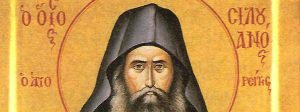Glory to God the Father, the Son, and the Holy Spirit. Amen.
Today the Church opens a new service book: The Lenten Triodion. That’s where we will get all the hymns and special services leading up to the Great Fast, to lead us through it, and to prepare for Holy Week and the bright Resurrection of Christ.
Here we are at the second of these Sundays that prepare us to enter into the great fast. Last week we met Zacchaeus the tax collector and he taught us that in order to approach the Lord we need to come in humility.
Today we meet two men in church. We meet the churchgoer who fasts twice a week, tithes faithfully, is in church all the time — and we meet a tax collector who everyone knows is a crook, yet who has for some reason darkened the door of the church.
And the Lord tells us in the parable that it was the wicked man who repented, who went home with his sins forgiven, while the one who kept all the rules was proud of himself — and “God opposes the proud, but gives grace to the humble.”
It makes sense to think of today’s tax collector together with Zaccheus, the tax-collector we met last week. We read about Zaccheus’s miraculous repentance. What did his life look like after that? Today’s parable brings a tax-collector to church. How does a man pray who has turned his life over to the care of his Lord? “God, be merciful to me, a sinner.”
You know who does not go home with his sins forgiven? The pillar of the church who has fulfilled the whole law and is satisfied with his righteousness. “God, I thank you that I am not like other men – those extortioners, unjust, adulterers, or even this tax collector. I fast twice a week. I tithe.”
Here is a discipline for you: Every time you catch yourself doing something good: You’ve been patient with your husband or wife or kids; you’ve given your lunch to a panhandler; you’ve prayed for your enemy. Now give thanks to God for giving you the gift of succeeding. Other days you’ve failed, you’ve omitted to do what you should, you’ve made excuses – but today God gave you the gift of succeeding in obeying him and he’s used you to carry out some act of virtue. Don’t claim it as your own accomplishment – instead give thanks, honor God who set up the situation and gave you grace to do his will.
If that’s your practice, then you won’t be tempted to tell anyone what you did. You won’t feel the need to brag about it, and lose your reward. And you won’t catch yourself telling the Lord, “I thank you that I’m not like that sinner over there!”
The Lord ends his parable by saying, “Everyone who exalts himself will be humbled, and he who humbles himself will be exalted.”
There is a promise that’s repeated three different times, in the Proverbs of Solomon, in the epistles of Saint Peter, and Saint James.
“God opposes the proud, but gives grace to the humble” (Proverbs 3:34; 1 Peter 5:5; James 4:6). God opposes the proud. Do you want God for your enemy? That’s how you get God as your enemy.
Last night’s Vespers verses have already given us our sermon for today:
Brethren, let us not pray like the Pharisee, because he who exalts himself will be humbled. Let us humble ourselves before God, and while we fast let us pray like the tax collector: God, be merciful to us sinners.
Let us flee from the boasting of the Pharisee, and learn to humble ourselves like the tax collector, while we cry out to the Savior: Have mercy on us, you who alone are quick to forgive.
Every good work is rendered useless by foolish pride. And all evil is cleansed by humility. In faith let us accept humility and completely avoid the path of vain self-conceit.
O faithful, let us shun the pride of the Pharisees. Let us not say “We are pure” as he did. Instead, let us follow the righteous way of the tax collector in his humility, which gained him the mercy of God.
Each Sunday until the beginning of Lent teaches us something about fasting. Today we learn not to compare ourselves with one another.
You know, it’s not only during fasting periods, but year-round that we look at our own plate and not at anyone else’s. You know how much you fast, and what you hope to offer to the Lord in obedience.
But your neighbor who eats pizza and steak during the Fast – he is not your responsibility. He’s not even a temptation. When thoughts of comparison come to mind, you have no obligation to let them stay. The answer to thoughts of comparison is always the prayer of the tax collector: “God be merciful to me, a sinner!”
Look at your own plate. The only reason to look at anyone else’s plate is to make sure they have enough.
This coming week, the Church teaches us to prepare for the Great Fast – by not fasting. This whole week we will not fast at all. This Wednesday and Friday? Load up on meat and cheese, enjoy a glass of “wine that makes glad the heart of man” (Psalm 103:15), and receive it all with thanksgiving to God. This week without fasting removes any opportunity for comparison or pride: We are all like the tax collector who’s never fasted, and our salvation is only in the mercy of God. When we are not fasting, we can’t compare ourselves to anyone else.
If your neighbor or your family member is not diligent in fasting, now you are the same. So you can not judge anyone. If you have been ignoring the fasts, then here is a gentle entry into the Church’s discipline, and if you’ll take it up, it can heal the passions of the soul. All you have to do this week is eat what you like every day.
So here are this week’s marching orders for disciples approaching the struggle of the fast: We are forbidden to compare ourselves. Saint Paul writes, “You are judging by appearances… Those who measure themselves by themselves and compare themselves with themselves, they are not wise” (2 Corinthians 10:7,12).
We have no reason to boast. Saints and sinners all rely on the mercy of God, who opposes the proud but gives grace to the humble.
To the glory of God the Father, the Son, and the Holy Spirit.






